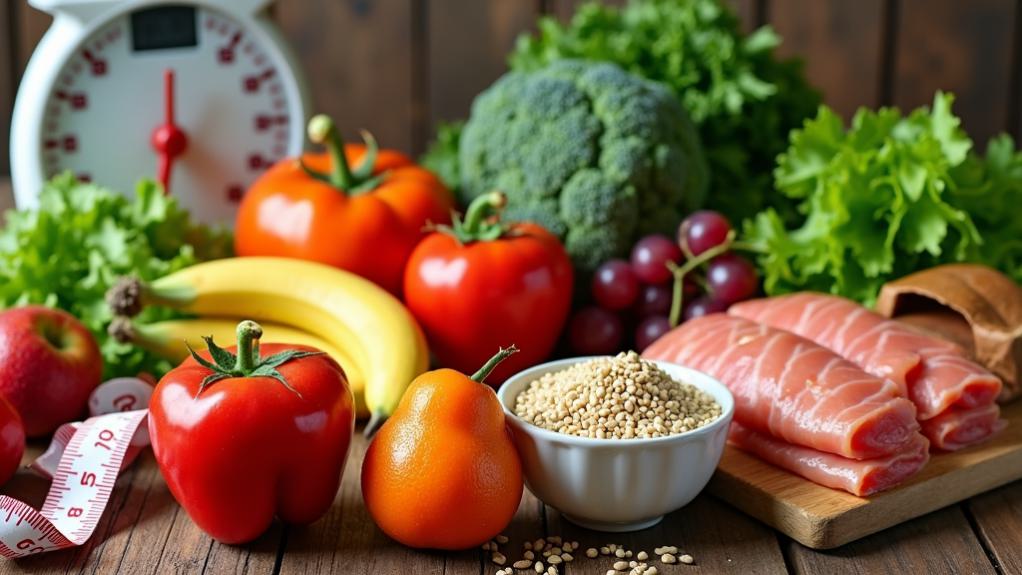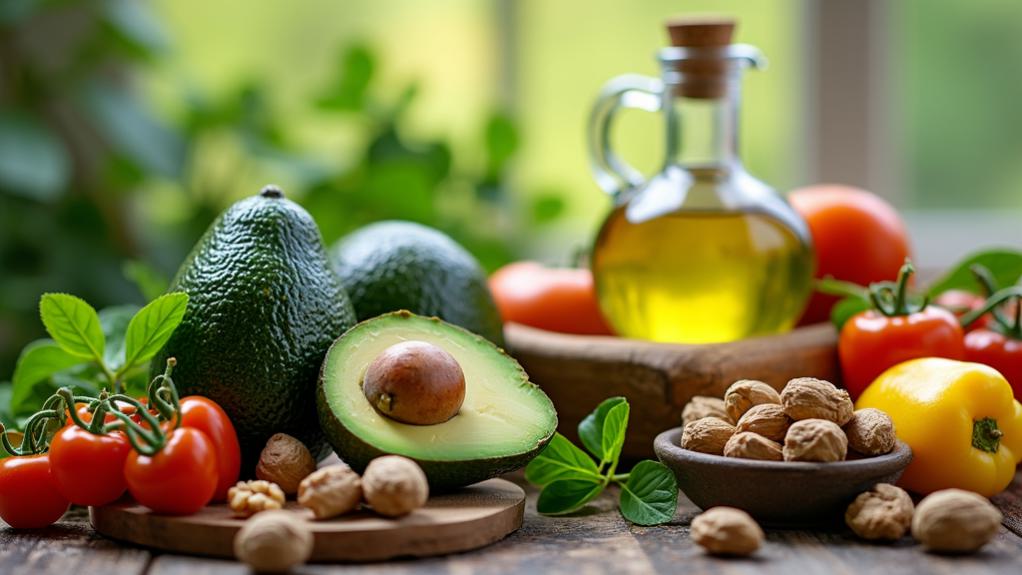To support your fitness goals after 40, focus on nutrient-dense foods. Prioritize protein to maintain muscle mass; think eggs or Greek yogurt for breakfast. Incorporate whole grains and fiber-rich fruits for digestive health and appetite control—aim for about 25 grams of fiber daily. Stay hydrated with at least 91 ounces of water to aid metabolism. Choose healthy fats like avocados and olive oil to support heart health, and limit added sugars and saturated fats. Finally, practice mindful eating to improve awareness of hunger cues. There’s so much more to explore about optimizing your nutrition for overall fitness and well-being. Additionally, consider incorporating a variety of colorful vegetables into your meals to provide essential vitamins and minerals. To further support your fitness goals, consider consulting a registered dietitian to develop a personalized nutrition plan that aligns with your physical activity. By prioritizing nutrient-dense foods and staying mindful of your eating habits, you can optimize your nutrition for physical fitness and overall well-being.
Key Takeaways
- Incorporate protein-rich foods, like lean meats and Greek yogurt, to help preserve muscle mass and support metabolism after 40.
- Prioritize whole grains and fiber-rich foods to aid digestion, control appetite, and stabilize blood sugar levels.
- Stay hydrated by drinking at least 2.7 liters of water daily to support overall health and enhance energy levels.
- Focus on nutrient-dense foods, including colorful fruits and vegetables, to reduce inflammation and combat age-related health risks.
- Limit added sugars and saturated fats to less than 10% of daily calories to promote heart health and manage weight effectively.
Nutritional Changes After 40
As you enter your 40s, your body undergoes significant changes that influence your nutritional needs. You might notice a gradual loss of muscle mass, averaging about 0.5 pounds each year. To counteract this, focus on incorporating protein-rich foods into your meals. These can help maintain your muscle health and support a more active lifestyle.
Hormonal shifts and a slowing metabolism also mean it’s vital to adjust your dietary intake. To prevent unwanted weight gain, aim to keep added sugars and saturated fats to less than 10% of your daily calories. Instead, prioritize healthy food options that nourish your body.
Whole grains should become a staple in your diet, with at least half of your grain intake coming from these sources. They’re packed with essential nutrients and aid in digestion, promoting overall well-being.
Lastly, don’t forget about hydration. As you age, your thirst sensation may decrease, so make a conscious effort to drink plenty of water throughout the day.
Essential Nutrients for Longevity
As you age, focusing on essential nutrients becomes vital for promoting longevity and overall health.
Incorporating calcium, dietary fiber, potassium, and vitamins A, C, and B-12 into your diet can greatly affect your well-being.
Key Nutrient Requirements
Maintaining your health after 40 requires a keen focus on essential nutrients that support longevity. To thrive, you should prioritize calcium, aiming for 2 to 3 servings of calcium-rich foods daily. This is vital for bone health, especially as you age.
Your daily fiber goal should be around 25 grams, which aids in digestion and helps you feel full, making weight management easier.
Don’t overlook vitamin B-12, as its absorption decreases with age. Incorporate lean meats, fish, dairy, and fortified cereals to guarantee peak brain function and red blood cell production.
Additionally, healthy fats play a pivotal role in your diet. Focus on unsaturated fats from sources like avocados, olive oil, and fatty fish. These fats are essential for heart health, so consider consulting a nutrition coach to help you manage portion sizes effectively.
Nutritional Sources and Benefits
Eating a balanced diet rich in essential nutrients is key to thriving after 40. As you age, your body needs specific nutritional sources to maintain health and support your fitness goals.
Here are four essential nutrients that offer significant health benefits:
- Calcium: Aim for 2 to 3 servings of calcium-rich foods daily, like low-fat dairy or fortified alternatives, to combat bone density loss.
- Vitamin B-12: With age, absorption decreases, so include lean meats, fish, and fortified cereals to support red blood cell production and cognitive function.
- Dietary Fiber: Endeavor for 25 grams per day through whole grains, fruits, and vegetables to aid digestion, manage weight, and lower chronic disease risk.
- Potassium: Incorporate potassium-rich foods like bananas, sweet potatoes, and spinach to promote heart health and regulate blood pressure.
Managing Metabolism and Weight

Metabolism tends to slow down after 40, and understanding how to manage this shift is vital for maintaining a healthy weight. Hormonal changes can lead to a decrease in muscle mass, which typically results in burning fewer calories. To counteract this, incorporating strength training into your routine is important. Aim for at least two sessions per week to help preserve muscle and boost metabolism.
You can also optimize your diet for weight loss by focusing on nutrient-dense foods. Start your day with a protein-rich breakfast to kickstart your metabolism and keep you feeling full. Prioritize fiber-rich foods like whole grains and fruits, as they aid in appetite control and promote digestive health. Staying hydrated is equally important, so drink plenty of water throughout the day.
Regular physical activity not only helps manage body composition but also reduces the risk of abdominal fat accumulation, which is linked to diabetes and heart disease.
Addressing Health Risks
As you age, it’s vital to recognize the increased health risks like diabetes, heart disease, and osteoporosis.
By focusing on nutrition and regular check-ups, you can proactively prevent these issues and maintain your well-being.
Strength training and a balanced diet rich in calcium and vitamin D are essential strategies to support your body’s changing needs.
Common Aging Health Risks
Managing health risks becomes increasingly important as you enter women’s health midlife and beyond. As you age, you’re more likely to face several health challenges that can impact your fitness goals.
Here are some common risks to keep in mind:
- Belly Fat Accumulation: Aging can lead to increased belly fat, which is linked to heart disease and diabetes.
- Muscle Mass Loss: Women lose muscle mass at double the rate of men, raising the risk of frailty and mobility issues.
- Hormonal Changes: These changes can boost hunger and slow metabolism, making weight management more difficult.
- Core Muscle Weakness: Loss of core muscle contributes to abdominal fat, emphasizing the need for regular strength training.
To mitigate these risks, focus on strength training to preserve muscle mass and combat belly fat.
Regular check-ups are essential for early detection of age-related conditions, allowing for timely interventions.
By understanding these risks, you can take proactive steps to maintain your health and support your fitness goals.
Nutrition for Disease Prevention
Taking charge of your nutrition is essential for reducing the risk of chronic diseases as you age. As you approach your 40s and beyond, consider adopting a nutrient-dense diet that focuses on whole foods while minimizing processed options. This means filling your plate with colorful fruits and vegetables, whole grains, and lean proteins.
These foods can help reduce inflammation and bolster your immune function, both critical for disease prevention.
Don’t forget about calcium and vitamin D, which are important for maintaining bone health and preventing osteoporosis. Aim for at least 25 grams of dietary fiber daily; it aids digestion and regulates blood sugar levels, reducing the risk of metabolic syndrome and type 2 diabetes.
Incorporating heart-healthy fats from sources like avocados, olive oil, and fatty fish can help lower cholesterol and support your cardiovascular health, especially as heart disease risk rises with age.
Regular Health Check-Ups
Health and Wellness for Women in Midlife: Regular health check-ups become increasingly important as you enter your 40s, serving as a key strategy in monitoring and managing age-related changes.
These visits help you stay on top of your health, especially as you may experience shifts in muscle mass and an increase in abdominal fat, which can elevate your risk for chronic diseases like diabetes and heart disease.
To make the most of your check-ups, consider focusing on the following:
- Annual screenings for blood pressure, cholesterol, and glucose levels to catch potential health issues early.
- Bone density tests for women starting at 40, to assess osteoporosis risk.
- Discussions about your dietary habits and exercise routines with healthcare providers for personalized recommendations.
- Tracking hormonal changes that could affect your weight management and recovery times.
Regular consultations will help you adapt your fitness and nutrition strategies, ensuring you’re not only maintaining a healthy weight but also supporting your overall well-being.
Taking these proactive steps can empower you to lead a healthier, more active life as you age.
Importance of Hydration

Hydration is essential for your overall health and fitness, especially as you navigate life after 40. Staying properly hydrated supports your metabolism, digestion, and even weight management. Even mild dehydration can slow down calorie burning and sap your energy levels, making it harder to stay active. Aim for at least 2.7 liters (91 ounces) of total water intake each day, which includes beverages and food sources.
Drinking water before meals can help control your appetite and may reduce calorie intake. This simple habit can be a game-changer for your weight management efforts. Plus, consistent hydration supports joint health, easing discomfort during physical activity, allowing you to maintain an active lifestyle.
Here’s a quick reference guide for your hydration goals:
| Time of Day | Hydration Tips | Benefits |
|---|---|---|
| Morning | Start your day with a glass of water | Kickstart metabolism |
| Before Meals | Drink water 30 minutes prior | Control appetite |
| During Workouts | Sip water regularly | Maintain energy and performance |
| Afternoon | Opt for herbal tea | Stay hydrated without calories |
| Evening | Limit caffeine and alcohol | Promote better sleep quality |
Prioritize your hydration for enhanced health and fitness!
Incorporating Protein in Diet
Maintaining an active lifestyle after 40 goes hand in hand with ensuring you’re getting enough protein in your diet. As you age, your body requires around 1.0 to 1.2 grams of protein per kilogram of body weight daily to counteract muscle loss. Focusing on lean protein sources can help you meet your needs while promoting overall health.
Here are some practical ways to incorporate protein into your meals:
- Add eggs to your breakfast or opt for Greek yogurt for a protein-packed start.
- Include legumes, like beans or lentils, in your salads for a nutritious boost.
- Snack on nuts or low-fat cheese to keep your energy levels up between meals.
- Choose poultry and fish over red meat to reduce health risks associated with processed meats.
Including protein in each meal and opting for protein-rich snacks not only aids muscle maintenance but also helps you feel fuller, making it easier to manage your weight.
Embracing Healthy Fats

Healthy fats are like the unsung heroes of your diet, playing an important role in supporting heart health and aiding weight management as you age. Foods like avocados, olive oil, and fatty fish not only taste great but also contribute to your overall well-being. As you get older, incorporating these healthy fats can help lower bad cholesterol levels, reducing your risk of heart disease.
Moreover, healthy fats enhance satiety, meaning you’ll feel fuller for longer, which is essential for managing weight. Just remember that portion control is important; while these fats are nutrient-rich, they’re also calorie-dense. For instance, a single avocado packs around 240 calories. It’s important to balance your intake to avoid unnecessary weight gain.
Additionally, healthy fats aid in nutrient absorption. Vitamins A, D, E, and K are fat-soluble, so including moderate amounts of healthy fats in your meals can help your body utilize these important nutrients more effectively.
Prioritizing good fats while minimizing saturated and trans fats won’t only support your fitness goals but also enhance your long-term health. Embrace these healthy fats for a vibrant, energetic life after 40!
Choosing Whole Grains
Incorporating healthy fats into your diet sets a strong foundation for your nutritional choices, but don’t overlook the importance of whole grains. Whole grains are a powerhouse of nutrients that can greatly enhance your quality of life, especially after 40.
They’re rich in dietary fiber, which aids digestion and helps you maintain a healthy weight by promoting satiety. Aim for at least 25 grams of fiber daily.
Here are some key reasons to choose whole grains:
- Stabilizes Blood Sugar: Whole grains, like quinoa and brown rice, help regulate blood sugar levels, reducing the risk of type 2 diabetes.
- Heart Health: Research shows that whole grains can lower the risk of heart disease by 20-30%.
- Essential Nutrients: They provide B vitamins, iron, magnesium, and antioxidants vital for energy production as nutrient absorption declines with age.
- Supports Fitness Goals: Aim for at least half your daily grain intake from whole grains to support muscle mass and metabolism.
Incorporating whole grains into your meals not only boosts your health but also helps you feel more energized and satisfied throughout the day.
Anti-Inflammatory Food Choices

Often overlooked, anti-inflammatory food choices can play an essential role in supporting your overall health as you age. Incorporating these foods into your diet can help reduce inflammation and support joint health, especially for those over 40. Consider adding the following anti-inflammatory foods to your meals:
| Food Type | Examples | Benefits |
|---|---|---|
| Fruits | Berries, cherries | Rich in antioxidants, combat oxidative stress |
| Vegetables | Spinach, red peppers | High in vitamins, reduce inflammation |
| Healthy Fats | Fatty fish, walnuts | Omega-3s fight inflammation, lower disease risk |
| Fermented Foods | Yogurt, kimchi | Promote gut health, enhance immune function |
Regularly including spices like ginger and garlic can also add flavor while providing additional health benefits. By focusing on these anti-inflammatory foods, you’re not just enhancing your meals but also playing a proactive role in disease prevention. Adopting these choices can lead to a healthier lifestyle, helping you feel your best as you navigate the changes that come with age.
Mindful Eating Practices
Embracing mindful eating practices can transform your relationship with food and improve your overall health, especially after 40. By paying full attention to your eating experience, you can prevent overeating and enjoy smaller portions more.
Research shows that eating slowly and without distractions enhances your awareness of hunger and fullness cues, which promotes healthier food choices.
Here are some practical tips to incorporate mindful eating into your daily routine:
- Savor the flavors: Take time to enjoy the taste and texture of each bite.
- Keep a food diary: Track your meals and emotional triggers to increase accountability.
- Practice gratitude: Acknowledge the nutritional benefits of your food, fostering a positive relationship.
- Set realistic goals: Focus on achievable changes that support your health journey.
Conclusion
As you navigate your fitness journey after 40, remember that small, consistent changes can lead to lasting results. Embracing whole foods, healthy fats, and hydration isn’t just about looking good; it’s about feeling vibrant and reducing health risks. The truth is, your body deserves the care and nourishment that fuels your passions and pursuits. By prioritizing nutrition, you’re not just supporting your fitness goals—you’re investing in a healthier, happier future. So, let’s make those choices count!
Join our list
Subscribe to our mailing list and get interesting stuff and updates to your email inbox.

